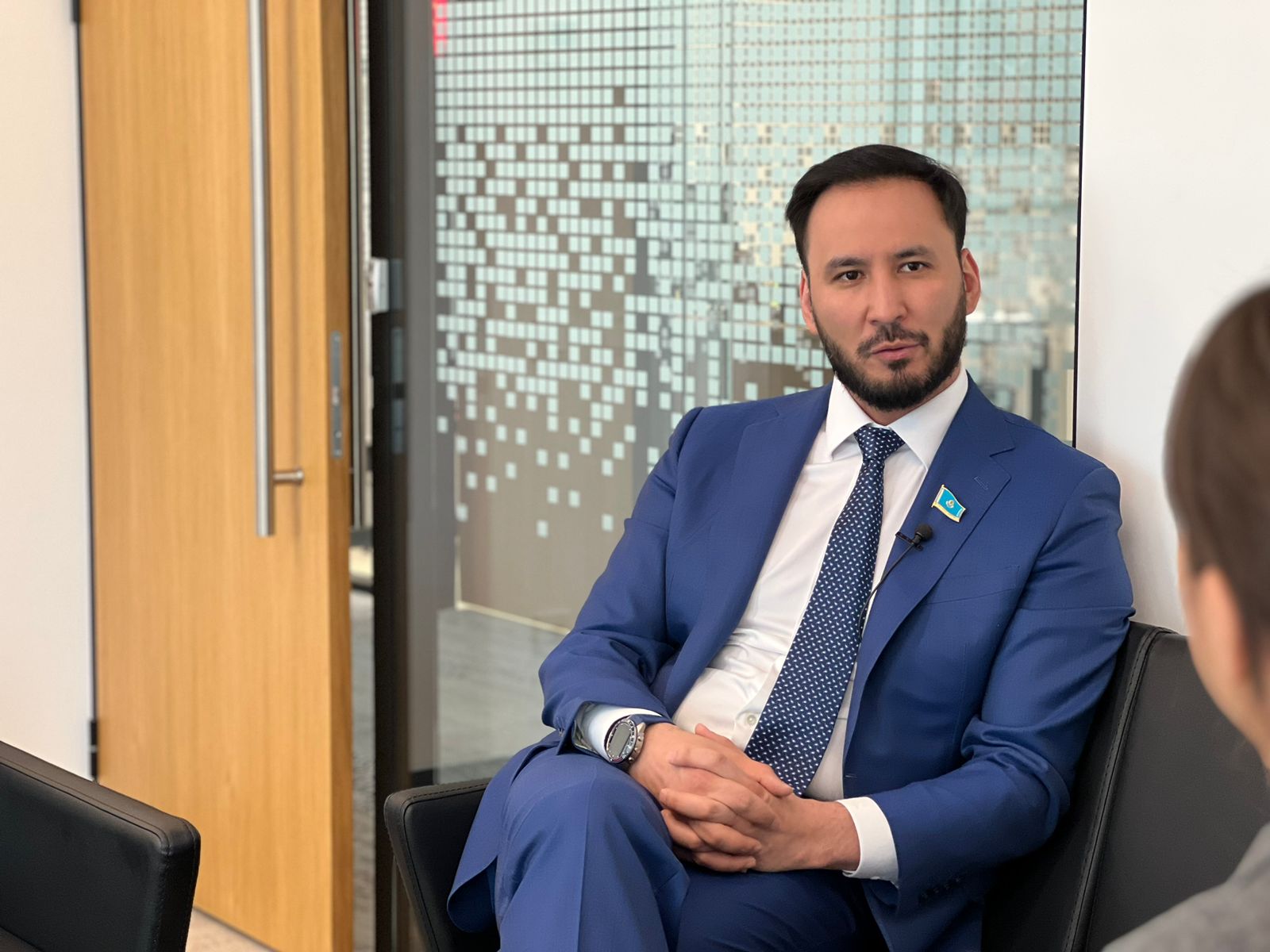ASTANA – Kazakhstan’s recent parliamentary election saw the emergence of new political forces that aim to create positive changes in the country. A young Respublica party, focused on economic development and entrepreneurship, has managed to navigate the complexities of the political landscape, securing seats in the Mazhilis (lower house of the Parliament) and bringing fresh initiatives to the nation’s legislative process. The Astana Times spoke with Aidarbek Khojanazarov, Chairman of the Respublica party, about the party’s values, challenges, and aspirations in shaping the country’s political landscape.

Aidarbek Khojanazarov, Chairman of the Respublica party. Photo credit: The Astana Times.
The party received registration from the Ministry of Justice in January and swiftly gained traction during the parliamentary election in March, capturing the attention of Kazakhstan’s citizens seeking fresh voices and perspectives in the political arena. As chairman of the party, Khojanazarov has been at the forefront of driving their vision.
“We are a modern party, the first to be registered in more than 10 years. A party of young entrepreneurs, people of action with practically no political experience. Each of the founders is a successful entrepreneur who is known throughout the country and who was active in society, participated in public activities and engaged in charity,” said Khojanazarov, who himself is a prominent businessman in agriculture.
When asked about the parliamentary election, Khojanazarov said the party’s third-place finish cannot be considered a success. They hoped for more seats in the Mazhilis, he said. The party received six seats in the 98-seat chamber, winning 8.59 percent of the votes (547,154).
“From the point of view of the initial experience, it was very interesting. Experts concluded it was one of the most transparent elections in the history of our country’s independence. Of course, we have something to strive for,” he said. “As entrepreneurs who are always used to winning, we do not call it [third place] a success. For us it is an intermediate stage. We are winners by nature. Success awaits us in 2028.”

Photo credit: The Astana Times.
He emphasized the significance of transparency, digitalization and systematic approach in decision-making, describing it as the party’s key values. Khojanazarov said many decisions and discussions take place behind the closed doors.
“The second value is technology. I want to emphasize our age, modernity, and our openness to digital solutions. We believe digitalization will be the solution to most of our political challenges. We see the need to digitize elections, which will result in greater trust and greater transparency,” he said.
Systematic approach is the third value the party seeks to bring to the country’s political system. Khojanazarov stressed that government approaches to addressing problems lack systemic solutions and a long-term vision.
“We can see that the system that has been formed over the past 30 years has shown its insolvency. It showed that the methods chosen by the previous deputies (members of parliament) and the authorities did not lead us to the result that people expect from us. It is precisely the systemic changes that our country needs now, and it is precisely these systemic changes that we can offer the country,” he said.
“We see that there is a hunger for new ideas, specialists, new perspectives and approaches. This is what we offer,” he added.
Need for more effective and systemic public administration
Living standards and income levels remain the biggest challenge, said Khojanazarov. According to the Kazakh Bureau of National Statistics, unemployment hit 4.9% in 2022, with the average per capita income at 167,037 tenge ($376). Meanwhile, inflation has spiraled to 16.8% as of April 2023.
“To put it mildly, this is the result of wrong policies, when our authorities decided to ‘put out the fire’ by giving freebies, such as writing off loans. Huge expenditures, around 30 percent of the budget, are spent on social needs instead of increasing the efficiency of our economy. We continue to waste our wealth,” he said.
The inability to think long-term, described by Khojanazarov as “short-termism,” is a major obstacle in sustainable decision-making. The focus should be on yielding clear and predictable results, he says.
“The reason for this is the complete fear that is omnipresent among the authorities – total paralysis. Everyone is afraid of everything, they cannot understand what they can and cannot [do]. The reason for this is the constant search for someone to blame for failures instead of drawing conclusions and taking corrective action. Our best corrective action is to put a person in jail. When there is fear in your organization, it leads to paralysis, lies and degradation because people stop telling the truth, stop seeking new opportunities,” he said.
The state is failing to live up to the so-called social contract, Khojanazarov claimed.
“In the 2000s, when people in Kazakhstan lived well, everyone was happy with everything. But at a certain point since the end of the 2000s, the state began to perform fewer duties under the social contract, and in the last 10 years, almost ceased to perform most of its duties. In January [2022], people came out to the streets because they were outraged by the violation of this social contract. In my opinion, the new government is very willing to listen,” said Khojanazarov.
The path toward a Just and Fair Kazakhstan, a paradigm encompassing reforms and modernization in the country, is long. However, Khojanazarov sees some positive signs in this effort.
“If you have been building an unjust Kazakhstan for 30 years, you will not build a just Kazakhstan in a year or a day, because injustice is a cancerous tumor. Today injustice has penetrated into all organs of our country. Chemotherapy to destroy this cancerous tumor takes a long time. This is the path to justice. The most important thing is that we are on this path, and the presence of our party in the ranks of deputies of the Mazhilis of the eighth convocation is one of the indicators and steps towards a just Kazakhstan,” said Khojanazarov.
Focus on human capital
The Respublica party aims to foster human capital development as one of the key solutions to the country’s existing problems.
“Knowledge and education are an asset. No one can take this asset away, not the government, not the party, not the akim [mayor or governor]. It is an asset that will feed you for life,” he said.
He underlined significant gaps in the education system and labor market.
“Education is science, business, and higher education. If these three institutions work together, the graduates will be in maximum demand. What we have now is a paradox. We have huge unemployment and at the same time a huge percentage of staff shortage,” he said.
According to Khojanazarov, quality education, good health, and a high level of culture significantly increase a person’s chances in the labor market, which leads to higher income, and ensures a decent standard of living.
Work in the Mazhilis
With the Mazhilis serving as the platform for decision-making, the party’s six deputies have made their mark by actively participating in parliamentary debates and contributing to policy discussions. Khojanazarov highlighted the importance of collaborative efforts, saying boundaries between parties became blurred in the Mazhilis.
“There are a lot of laws, either they were written imperfectly or became irrelevant due to the circumstances that occurred in recent years or even a year, taking into account the latest geopolitical situation. Adaptation is always necessary,” he said.
The deputy expressed the party’s commitment to working collaboratively with other parliamentary factions to bring about meaningful change that benefits all citizens.
Speaking about the current agenda in the Parliament, Khojanazarov said they are discussing tightening regulation on bookmaker offices and synthetic drugs. Concerns about both issues have increased recently. President Kassym-Jomart Tokayev called for severe punishment for distributors of synthetic drugs in his state-of-the-nation address in September 2022.
